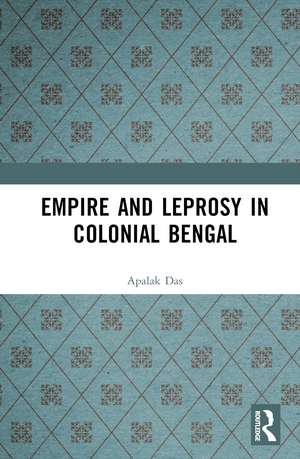Empire and Leprosy in Colonial Bengal
Autor Apalak Dasen Limba Engleză Hardback – 12 mar 2024
Rich in archival resources, this book is an essential read for scholars and researchers of history, Indian history, public health, social history, medical humanities, medical history and colonial history.
Preț: 1006.43 lei
Preț vechi: 1227.35 lei
-18% Nou
Puncte Express: 1510
Preț estimativ în valută:
192.58€ • 201.48$ • 159.98£
192.58€ • 201.48$ • 159.98£
Carte tipărită la comandă
Livrare economică 02-16 aprilie
Preluare comenzi: 021 569.72.76
Specificații
ISBN-13: 9781032513904
ISBN-10: 103251390X
Pagini: 252
Ilustrații: 5 Tables, black and white; 8 Halftones, black and white; 8 Illustrations, black and white
Dimensiuni: 156 x 234 x 16 mm
Greutate: 0.63 kg
Ediția:1
Editura: Taylor & Francis
Colecția Routledge India
Locul publicării:Oxford, United Kingdom
ISBN-10: 103251390X
Pagini: 252
Ilustrații: 5 Tables, black and white; 8 Halftones, black and white; 8 Illustrations, black and white
Dimensiuni: 156 x 234 x 16 mm
Greutate: 0.63 kg
Ediția:1
Editura: Taylor & Francis
Colecția Routledge India
Locul publicării:Oxford, United Kingdom
Public țintă
PostgraduateRecenzii
‘Focusing on Bengal, this book provides fresh insights into how leprosy as a communicable disease was perceived as a ‘social threat’ by the Raj, and its treatment and care were institutionalised within its legal framework. Along with the contributions of the missionaries and the western medical research, it also looks at the indigenous traditions for treating leprosy.’
Sekhar Bandyopadhyay, Emeritus Professor of History, Victoria University of Wellington
‘Enriched by vernacular and archival research, Das’s Empire and Leprosy in Colonial Bengal investigates power dynamics in the relationships between colonialism, disease and patient experience in British India. It is a valuable addition to the history of medicine.’
Jane Buckingham, Associate Professor of History, University of Canterbury, New Zealand
‘Empire and Leprosy in Colonial Bengal takes the readers on a hitherto unexplored journey of the historical happenings of leprosy in a powerful socio-cultural context of new connotations, narratives of inclusion and changing responses to colonial policies of shaping the social history of leprosy in India.’
Poonam Bala, Professor Extraordinarius, UNISA, South Africa
Sekhar Bandyopadhyay, Emeritus Professor of History, Victoria University of Wellington
‘Enriched by vernacular and archival research, Das’s Empire and Leprosy in Colonial Bengal investigates power dynamics in the relationships between colonialism, disease and patient experience in British India. It is a valuable addition to the history of medicine.’
Jane Buckingham, Associate Professor of History, University of Canterbury, New Zealand
‘Empire and Leprosy in Colonial Bengal takes the readers on a hitherto unexplored journey of the historical happenings of leprosy in a powerful socio-cultural context of new connotations, narratives of inclusion and changing responses to colonial policies of shaping the social history of leprosy in India.’
Poonam Bala, Professor Extraordinarius, UNISA, South Africa
Cuprins
List of Illustrations x
Foreword xii
Acknowledgements xiii
List of Abbreviations xvi
Glossary xviii
Introduction 1
1 Colonialism, Legislation and Leprosy: Bengal and Empire 16
2 Objectifying ‘Lepers’, Constructing Identity: Missionaries and Colonial Care in the Leper Asylums of Bengal 57
3 Empire and Institution: Leprosy Research in the Calcutta School of Tropical Medicine (CSTM) 115
4 Nationalising Disease: ‘Kustha cikitsha’ and ‘Kustha rogi’ in Bengali Newspapers and Health Periodicals 155
Conclusion 193
Bibliography 206
Index 227
Foreword xii
Acknowledgements xiii
List of Abbreviations xvi
Glossary xviii
Introduction 1
1 Colonialism, Legislation and Leprosy: Bengal and Empire 16
2 Objectifying ‘Lepers’, Constructing Identity: Missionaries and Colonial Care in the Leper Asylums of Bengal 57
3 Empire and Institution: Leprosy Research in the Calcutta School of Tropical Medicine (CSTM) 115
4 Nationalising Disease: ‘Kustha cikitsha’ and ‘Kustha rogi’ in Bengali Newspapers and Health Periodicals 155
Conclusion 193
Bibliography 206
Index 227
Notă biografică
Apalak Das is Assistant Professor in the Department of History, Rani Birla Girls’ College under Calcutta University, India. He did his PhD from the Department of History, Jadavpur University on Leprosy in Bengal in 2022. His research looks broadly at the social history of medicine in colonial India. He was also a former Research Fellow of the History of Medicine Fellowship at the Asiatic Society, Kolkata, for a two-year term, 2017–2019.
Descriere
This book traces the dynamics of the interface between colonial policy on leprosy and religion, science, and society in Bengal.
